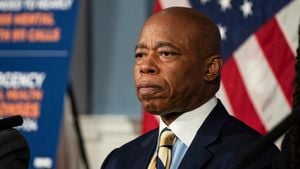South Korea and Malaysia have officially established a strategic partnership to bolster collaboration across various sectors, marking a significant step as both nations celebrate 65 years of diplomatic relations. The announcement came during a summit held on November 25, 2024, between South Korean President Yoon Suk Yeol and Malaysian Prime Minister Anwar Ibrahim, who is currently on a three-day official visit to Seoul.
The summit highlighted commitments to deepen ties particularly focused on the defense sector but also extending to trade, energy, and supply chain enhancements. President Yoon expressed aspirations for the partnership to transcend traditional economic areas, aiming to include advanced fields such as artificial intelligence, biotechnology, green energy, and the arms industry.
“I hope the bilateral cooperation would expand beyond trade, investment, and people-to-people exchanges to include defense, the arms industry, and new domains like green hydrogen and key minerals,” President Yoon stated during his opening remarks, emphasizing the broad potential of this partnership.
The defense industry was particularly underscored as symbolic of mutual trust, with both leaders agreeing to advance research and development collaborations. This strategic focus follows Korea Aerospace Industries’ signing of a contract earlier this year to supply 18 FA-50 fighter jets to Malaysia, with plans to engage with Malaysia on future procurement of additional light attack jets.
Negotiations for concluding a bilateral free trade agreement are expected to be finalized by 2025, aiming to facilitate cooperation across services, investment sectors, and up-and-coming industries. This commitment is seen as pivotal for enhancing commercial ties, particularly as both nations seek to leverage their unique strengths.
Further agreements were bolstered by memorandums of understandings signed during the summit which focus on collaboration across diverse fields, including the supply chains for significant minerals, carbon capture technologies, and projects aimed at reducing greenhouse gas emissions. Tourism emerged as another point of interest, signaling intentions to increase people-to-people connections, which was highlighted as important for fostering mutual cultural appreciation.
During the discussions, both President Yoon and Prime Minister Anwar expressed shared concerns over increasing military cooperation between North Korea and Russia. The leaders condemned North Korea's recent ballistic missile launches, articulately urging the regime to adhere to United Nations Security Council resolutions.
“We call upon Pyongyang to halt provocations and commit to complete, verifiable, and irreversible denuclearization,” both leaders stated, emphasizing security concerns as central to regional stability. Anwar's support for Yoon's vision of a peaceful unified Korean Peninsula reflects the strategic alignment of both nations concerning regional security and political stability.
This summit not only marks a new chapter in South Korea-Malaysia relations but also sets a precedent for future cooperation on defense as well as technological advancements, reflecting both countries' readiness to embrace and adapt to the rapidly changing global environment.
By enhancing their strategic partnership, South Korea and Malaysia aim to cultivate stronger bilateral ties which could yield significant benefits as they navigate challenges and opportunities within the region.



